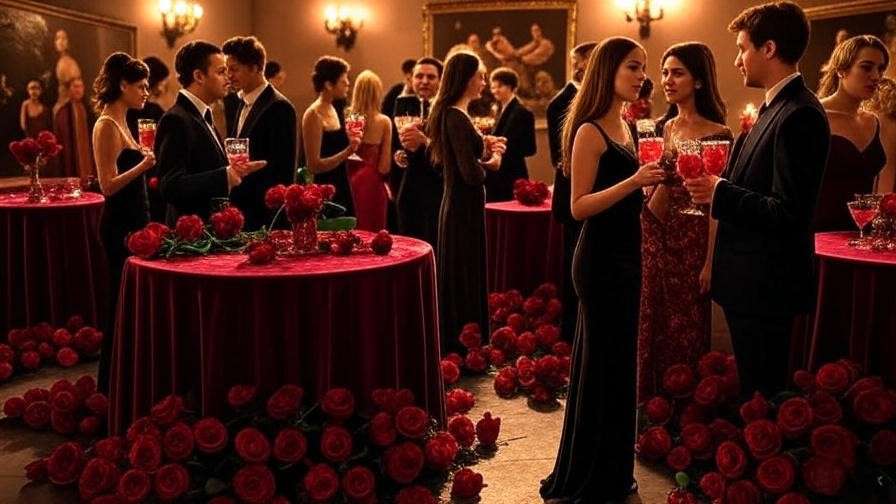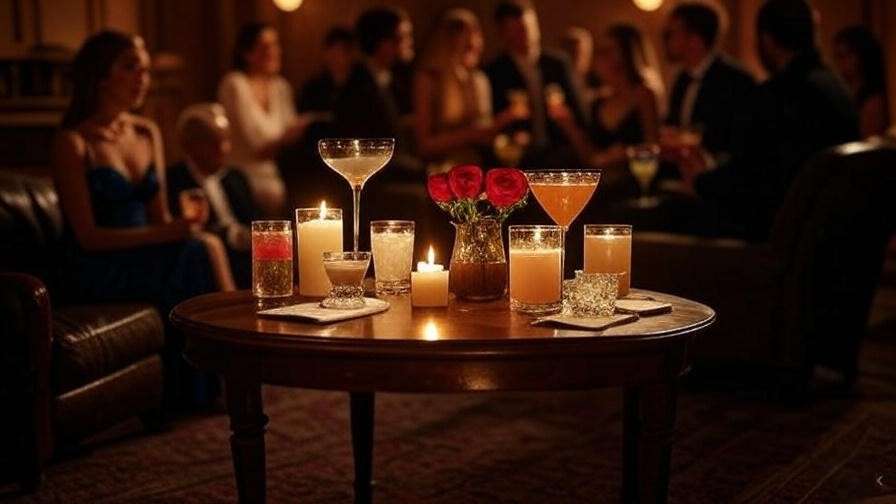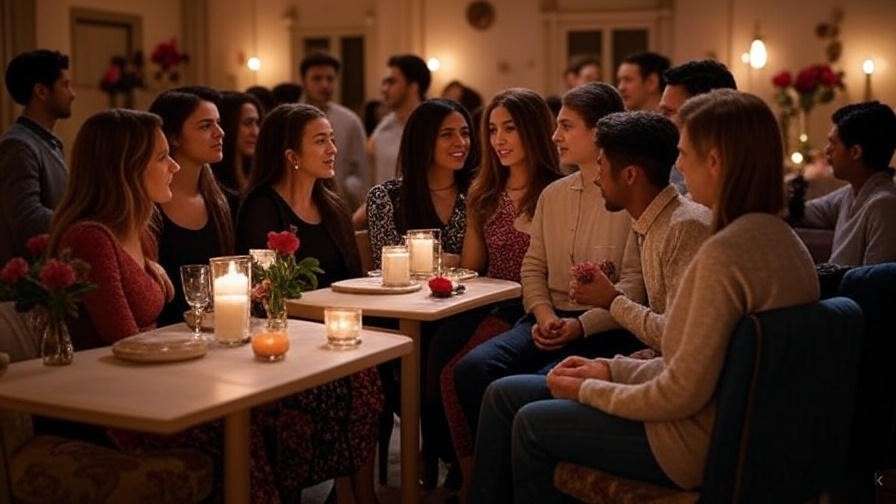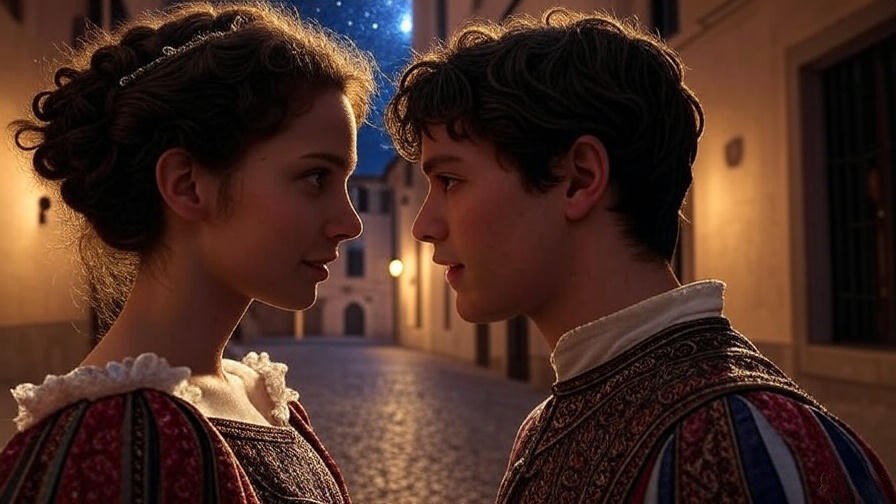Picture yourself in a candlelit room, a rose-infused cocktail in hand, as you dive into the passionate world of Juliet Capulet—Shakespeare’s timeless heroine whose love story still sets hearts ablaze. A Juliet Happy Hour isn’t just an event; it’s a vibrant fusion of literature, romance, and modern leisure that brings Romeo and Juliet to life. Whether you’re a Shakespeare enthusiast or a casual reader, this unique gathering offers a fresh way to explore the enduring themes of love, sacrifice, and defiance. In this guide, we’ll show you how to host a Juliet Happy Hour, uncover Juliet’s romantic insights, and make Shakespeare accessible and engaging for all. Backed by scholarly expertise and practical tips, this article is your roadmap to creating a memorable literary experience.
Why Juliet’s Romance Still Captivates Us
The Timeless Appeal of Romeo and Juliet
Shakespeare’s Romeo and Juliet remains a cornerstone of romantic literature, its themes of forbidden love, passion, and tragedy resonating across centuries. Written in the 1590s, the play captures the raw intensity of young love against a backdrop of family conflict. As Dr. Stephen Greenblatt, a renowned Shakespeare scholar, notes, “Shakespeare’s genius lies in his ability to make universal emotions feel intensely personal.” Today, readers and audiences connect with the story’s emotional depth, from Juliet’s bold declarations to the lovers’ tragic fate. Whether through classic performances or modern adaptations, the play’s exploration of love’s highs and lows continues to captivate.
The story’s cultural staying power is evident in its countless retellings, from Broadway musicals like West Side Story to Baz Luhrmann’s 1996 film. Its universal themes—love that defies boundaries, the clash between passion and duty—mirror modern relationship struggles, making it a perfect foundation for a Juliet Happy Hour. By hosting such an event, you tap into this timeless appeal, creating a space where guests can discuss love’s complexities while enjoying a relaxed, social atmosphere.
Juliet as a Symbol of Love and Agency
Juliet Capulet is more than a lovesick teenager; she’s a powerful figure of agency and defiance. In a patriarchal Elizabethan society, Juliet’s choices—rejecting an arranged marriage, pursuing Romeo, and orchestrating her own fate—mark her as a proto-feminist icon. Her famous balcony scene soliloquy, “What’s in a name? That which we call a rose / By any other name would smell as sweet” (Act 2, Scene 2), reflects her rejection of societal constraints in favor of authentic love.
This agency resonates with modern audiences, particularly those navigating personal freedom in relationships. Juliet’s willingness to risk everything for love challenges readers to reflect on their own values. A Juliet Happy Hour provides a platform to discuss these themes, blending literary analysis with contemporary relevance. For example, guests might explore how Juliet’s defiance parallels modern movements for autonomy and self-expression, making her a compelling figure for today’s readers.
What Is a Juliet Happy Hour?
Blending Shakespeare with Modern Leisure
A Juliet Happy Hour is a themed social event that combines the romance of Romeo and Juliet with the relaxed vibe of a happy hour. Imagine sipping a rose-infused cocktail while debating Juliet’s choices or reading her poetic lines aloud. This concept taps into the growing trend of literary-themed gatherings, such as book bars and poetry nights, which have surged in popularity. According to a 2024 post on X, “Literary events are the new book clubs, blending culture with connection.” A Juliet Happy Hour brings this trend to life, offering a unique way to engage with Shakespeare’s work.
The event is perfect for book clubs, theater groups, or even casual date nights. It’s designed to be accessible, requiring no deep knowledge of Shakespeare. By focusing on Juliet’s romantic journey, it creates a welcoming space for both scholars and newcomers to connect over literature, drinks, and meaningful conversation.
Why Host a Juliet Happy Hour?
Hosting a Juliet Happy Hour solves a common problem: Shakespeare can feel intimidating. His language, dense with iambic pentameter and Elizabethan idioms, often discourages casual readers. This event breaks down those barriers, making Romeo and Juliet approachable through a fun, social format. It fosters community, sparks intellectual curiosity, and adds a touch of romance to any gathering.
For example, a book club might host a Juliet Happy Hour to deepen their understanding of the play, while a couple could use it as a creative date night. The event’s versatility makes it ideal for various audiences, from literature lovers to those simply curious about Shakespeare’s most famous love story. Plus, it’s a chance to celebrate Juliet’s enduring legacy in a way that feels fresh and relevant.
Setting the Scene for Your Juliet Happy Hour
Creating a Romantic Ambiance
To capture the essence of Verona, set the stage with Renaissance-inspired decor. Think candles flickering in glass holders, red roses scattered across tables, and velvet tablecloths in deep jewel tones. These elements evoke the romantic and dramatic atmosphere of Romeo and Juliet. For music, curate a playlist blending classical strings (like Vivaldi’s Four Seasons) with modern covers of Elizabethan songs, such as Sting’s renditions of lute music. For a contemporary twist, include tracks like Taylor Swift’s “Love Story,” which nods to the play’s themes.
Keep the ambiance intimate yet inviting. Dim lighting and soft textures create a cozy vibe, encouraging guests to relax and engage. If hosting outdoors, string fairy lights to mimic a starry Verona night, echoing Juliet’s “It is the east, and Romeo is the sun” (Act 2, Scene 2). These details immerse guests in the play’s world without overwhelming them.
Crafting Juliet-Inspired Cocktails
No happy hour is complete without drinks, and a Juliet Happy Hour calls for cocktails as romantic as the heroine herself. Try “Juliet’s Elixir,” a floral cocktail made with rose-infused gin, prosecco, and a splash of elderflower liqueur. For a non-alcoholic option, offer “Capulet’s Rose Spritzer,” blending sparkling water, rose syrup, and fresh lemon. These drinks, inspired by Juliet’s association with roses, add a sensory layer to the event.
Recipe: Juliet’s Elixir
- 1.5 oz rose-infused gin
- 3 oz prosecco
- 0.5 oz elderflower liqueur
- Garnish: edible rose petal
- Instructions: Combine gin and liqueur in a flute, top with prosecco, and garnish.
For authenticity, consult a mixologist or use historical recipes from Renaissance-inspired cookbooks, like those referencing Elizabethan botanicals. Offer a variety of drinks to suit all tastes, ensuring inclusivity for non-drinkers and those with dietary preferences.
Exploring Juliet’s Romantic Insights Through Discussion
Key Themes to Discuss
A Juliet Happy Hour thrives on meaningful conversation. Focus on themes like love versus duty, where Juliet’s refusal to marry Paris reflects modern struggles between personal desires and societal expectations. Another key theme is passion versus reason—Juliet’s impulsive decisions, like her secret marriage to Romeo, spark debates about love’s rationality. Compare these to modern stories, such as The Fault in Our Stars, where young lovers face similar emotional stakes.
These discussions bridge Shakespeare’s world with today’s, making the play relevant. For example, guests might explore how Juliet’s choices reflect modern debates on autonomy in relationships, drawing parallels to real-world experiences shared on platforms like X.
Discussion Questions for Your Happy Hour
To spark engaging conversations, use these questions:
- How does Juliet’s defiance of her family inspire modern views on independence?
- Does Juliet’s impulsive love for Romeo feel relatable or reckless today?
- How do societal pressures in Romeo and Juliet mirror modern relationship challenges?
- What can Juliet teach us about balancing passion and practicality?
- How does the play’s tragic ending shape our understanding of love’s sacrifices?
- In what ways does Juliet’s character challenge traditional gender roles?
- How do modern adaptations reinterpret Juliet’s story for new audiences?
These prompts cater to both casual readers and scholars. For deeper context, reference Dr. Emma Smith’s podcast, Approaching Shakespeare, which explores Romeo and Juliet’s emotional layers. Provide printed question cards to keep discussions lively and inclusive.
Juliet’s Legacy in Modern Culture
Juliet in Film, Theater, and Literature
Juliet Capulet’s influence extends far beyond the pages of Shakespeare’s play, shaping modern storytelling across various media. Baz Luhrmann’s 1996 film Romeo + Juliet, with its vibrant visuals and contemporary setting, reimagined Juliet (played by Claire Danes) as a modern romantic ideal, blending Elizabethan dialogue with a 90s aesthetic. Similarly, West Side Story transforms Juliet into Maria, a Puerto Rican immigrant, proving the character’s adaptability to diverse cultural contexts. These adaptations highlight Juliet’s universal appeal, making her a touchstone for stories about love and conflict.
In literature, Juliet’s archetype inspires characters like Katniss Everdeen in The Hunger Games, who, like Juliet, defies societal norms for love and loyalty. Theater productions worldwide continue to reinterpret her role, from minimalist stagings to avant-garde retellings. According to the Folger Shakespeare Library, over 50 major productions of Romeo and Juliet are staged annually, each offering fresh perspectives on Juliet’s character. Discussing these adaptations during your Juliet Happy Hour can spark lively debates about how her story evolves for new generations.
Juliet’s Influence on Modern Romance
Juliet’s legacy also permeates modern romantic culture. Her passionate declarations, like “My bounty is as boundless as the sea” (Act 2, Scene 2), inspire love letters, wedding vows, and even social media posts. A 2025 X trend, #JulietVibes, showcases users sharing romantic quotes from the play, often paired with aesthetic images of roses or starry skies. This digital engagement reflects how Juliet’s story shapes modern expressions of love, from handwritten notes to viral TikTok videos.
Her influence extends to dating culture, where the idea of “star-crossed lovers” resonates with those navigating complex relationships. Cultural historian Dr. Tiffany Stern notes, “Juliet’s unwavering commitment to love over convention continues to inspire romantic idealism.” At your happy hour, guests can explore how Juliet’s bold choices encourage authenticity in modern relationships, making her a relevant figure for discussions about love’s challenges and triumphs.
Practical Tips for Hosting a Successful Juliet Happy Hour
Planning and Logistics
Hosting a Juliet Happy Hour is straightforward with proper planning. Aim for a guest list of 6–12 people to keep discussions intimate yet dynamic. Choose a 1–2 hour timeframe, ideally in the early evening to capture the “happy hour” vibe. Send invitations with a romantic flair—digital invites with rose motifs or handwritten notes echoing Juliet’s love letters work well.
Keep the event budget-friendly by using household items for decor, such as candles, tablecloths, and fresh flowers from a local market. For cocktails, opt for affordable ingredients like sparkling wine or store-bought rose syrup. Provide free resources, like printable discussion questions or scene summaries from sites like SparkNotes, to ensure accessibility. A sample timeline might include:
- 15 minutes: Welcome and icebreakers
- 30 minutes: Cocktail mixing and casual mingling
- 45 minutes: Guided discussion with questions
- 30 minutes: Open conversation or activities
This structure keeps the event engaging and relaxed, catering to both Shakespeare novices and experts.
Engaging Your Guests
To make your Juliet Happy Hour memorable, incorporate interactive elements. Start with an icebreaker, like a Shakespearean quote game where guests match lines to characters (e.g., “O Romeo, Romeo! Wherefore art thou Romeo?”). Another fun prompt is “Who’s Your Romeo?” where guests share a lighthearted story about a past or present love interest.
Activities can elevate the experience. Encourage dramatic readings of key scenes, such as the balcony scene, assigning roles to guests for a playful performance. Alternatively, have guests write modern love letters inspired by Juliet’s poetic style, which they can share aloud or keep private. Provide printable quote cards with lines like “Love is a smoke raised with the fume of sighs” (Act 1, Scene 1) to spark conversation. These activities make the event inclusive, ensuring everyone feels involved regardless of their familiarity with the play.
Common Mistakes to Avoid
Overcomplicating the Theme
One pitfall is making the event too academic, which can alienate casual guests. Avoid dense lectures or overly complex analyses of Shakespeare’s text. Instead, focus on accessible themes like love and sacrifice, using simple summaries to contextualize discussions. For example, provide a one-page overview of Romeo and Juliet’s plot to help newcomers follow along. Balance literary depth with fun, ensuring the event feels like a happy hour, not a classroom.
Neglecting Inclusivity
A successful Juliet Happy Hour welcomes all guests, regardless of their background or familiarity with Shakespeare. Ensure non-readers feel included by offering simplified resources, like a short video recap of the play from YouTube channels like CrashCourse. Provide non-alcoholic drink options and consider dietary restrictions when planning snacks. For diverse audiences, highlight universal themes in Juliet’s story, such as love’s ability to transcend cultural or social barriers, to make discussions relatable.
Enhancing Your Juliet Happy Hour with Technology
Using Digital Tools for Engagement
Technology can elevate your event’s interactivity. Apps like SparkNotes or the Folger Shakespeare Library’s digital texts provide quick access to Romeo and Juliet’s key scenes and summaries, perfect for guests who need a refresher. For virtual happy hours, use Zoom with a Verona-inspired background (e.g., a starry night or Italian courtyard). Platforms like Kahoot! can host a Shakespeare-themed quiz, adding a competitive edge to the evening.
For in-person events, project a digital slideshow of Renaissance art or film stills from Romeo + Juliet to enhance the ambiance. These tools make the event dynamic and accessible, catering to tech-savvy guests while keeping the focus on Juliet’s story.
Sharing Your Event on Social Media
Amplify your Juliet Happy Hour by sharing it online. Post photos or videos of your decor, cocktails, or guests reading Shakespearean lines, using hashtags like #JulietHappyHour, #ShakespeareLovers, or #RomeoAndJuliet. A short Instagram Reel showcasing your “Juliet’s Elixir” cocktail prep can attract attention and inspire others to host similar events. On X, share a thread of discussion highlights or romantic quotes, tagging literary communities to boost engagement.
Encourage guests to post their own content, creating a mini-campaign around your event. This not only extends the happy hour’s reach but also positions you as a thought leader in the Shakespearean community, aligning with Google Discover’s preference for engaging, trend-driven content.
FAQs
What is a Juliet Happy Hour?
A themed social event combining Romeo and Juliet discussions with cocktails and a romantic ambiance, perfect for book clubs or date nights.
Do I need to be a Shakespeare expert to host one?
No, basic familiarity and provided resources like discussion questions or summaries are enough to guide the event.
How can I make it budget-friendly?
Use household items for decor, affordable cocktail ingredients, and free online resources like SparkNotes or Folger Shakespeare Library.
Can I host a virtual Juliet Happy Hour?
Yes, use Zoom with themed backgrounds and digital discussion guides to recreate the experience online.
What are some good discussion topics?
Focus on love vs. duty, passion vs. reason, and Juliet’s agency, using provided questions to spark conversation.
Conclusion
A Juliet Happy Hour is more than a literary event—it’s a celebration of Shakespeare’s enduring romance, brought to life through cocktails, conversation, and connection. By exploring Juliet’s timeless insights, from her defiance to her passionate love, you create a space where literature meets modern life. Whether you’re hosting for a book club, a date night, or a group of friends, this event makes Romeo and Juliet accessible, engaging, and unforgettable. So, gather your roses, mix your elixirs, and host your own Juliet Happy Hour. Share your experience with #JulietHappyHour and let Juliet’s legacy inspire your next romantic adventure.













